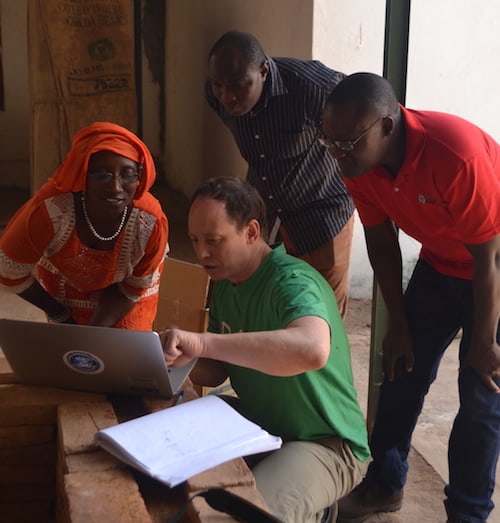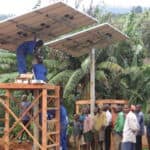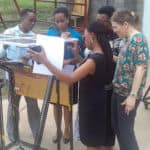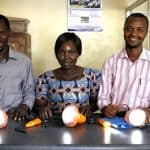A Toolkit to Identify Sustainable, Market-Based Energy Solutions in Off-Grid Areas
“Energy today is about everything we do. When it comes to nighttime, everyone is in the darkness – that alone is preventing development outcomes.”
Thierno Diallo, country director, Mercy Corps Niger
Energy access is essential for providing nutrition, clean water and sanitation and can significantly contribute to increased productivity and economic development – and, by extension, poverty alleviation. However, roughly 1.3 billion people worldwide lack access to the affordable modern energy products and services needed for reliable heating, cooking, mechanical power, transportation, lighting and telecommunications.
Multilateral and national aid organizations recognize this and their strategies to increase energy access understandably tend to focus on the regions that have the largest populations with the most acute energy needs. The private sector, on the other hand, naturally focuses on the most attractive markets for the products or services they sell. It is reasonable for aid organizations to serve beneficiaries in the most efficient way possible and for businesses to target profitable markets. At the same time, the energy needs of people in less-populated regions or otherwise challenging markets may be overlooked and their needs for affordable, renewable energy solutions – such as efficient cookstoves, solar lighting, water pumps and mechanical devices – unmet.
A toolkit to assess needs

The author (green shirt) explaining the Energy Assessment Toolkit.
In 2015, in an effort to increase energy access for more people in off-grid areas, MIT D-Lab began working with Mercy Corps to develop the Energy Assessment Toolkit. Our goal is to create a means by which organizations with strong connections in off-grid communities can assess local energy needs and select and implement market-based solutions that meet the energy needs of community residents and businesses.
Expertise in the energy sector is not a criterion for organizations considering using the Energy Assessment Toolkit, but a strong presence in the community and the ability to take action based on the opportunities identified are essential. Organizations that have used the toolkit include community-based businesses, nongovernmental organizations and civil society organizations. They all have ongoing programs in off-grid regions and are looking to further develop energy access programs that leverage their existing connections with communities.
We hope that by providing an actionable roadmap, organizations will be able identify energy products and services that could benefit the community, and might not reach them otherwise.
What the toolkit includes
The Energy Assessment Toolkit, which is open-source and available online, includes surveys and interview guides that an organization can use to gather information from a range of stakeholders, such as community residents, business owners, government officials and others. The kind of information the surveys and interviews explore includes:
- Current energy access and expenditures
- Aspirational energy needs
- Existing supply chains
- Community institutions and stakeholders (private sector, government, NGO)
The toolkit is modular, allowing the organization conducting the assessment to determine the scope and scale of the study. In addition to the data collection tools, the toolkit includes data entry and visualization tools that can be used to analyze the data collected as well as to guide the design of the assessment plan by identifying technologies and business models that effectively address the most pressing needs in a specific community or region. The goal is to enable organizations to collect the information needed to make informed decisions about how to meet the specific needs in their community through market-based initiatives. (Note: This community-based assessment approach is not intended to replace studies that track energy access on a national level or to generate market intelligence reports for external organizations looking to expand their business or programs into new markets.)
The Energy Assessment Toolkit is part of a larger suite of initiatives developed as part of the MIT D-Lab Off-Grid Energy Roadmap. D-Lab is also working on developing and curating resources to help organizations identify technologies and business models that can meet the needs of off-grid communities and guidance for designing pilot programs and market deployment.
Using the toolkit
We began piloting the toolkit in 2015 in El Salvador with ASAPROSAR, an NGO in Santa Ana that provides health, education, environment and economic development programs, and went on to conduct trainings with Mercy Corps country staff in Mali, Nigeria and Niger, where we iterated and improved the toolkit to better meet the needs of local teams.
The assessment Mercy Corps conducted in Mali identified the need for households to reduce the money spent on cooking fuel, and that the major reason why efficient cookstove technology had not reached this market was the lack of supply chain infrastructure due to security issues in the northern part of the country. Mercy Corps is now helping facilitate the distribution of cookstoves by connecting manufacturers in southern Mali to wholesalers and entrepreneurs in northern Mali. This pilot program could be implemented quickly because Mercy Corps Mali already had a program training entrepreneurs in the regions where communities could benefit from cookstoves. Mercy Corps has experience working with a wide range of local and global commercial actors to help test and demonstrate business models that have the potential to scale up to meet the energy needs of off-grid communities. In this case, all they needed was to identify the need and the product suppliers and they were ready to go. This was a great example of a local organization, well-connected in a community, with the capacity not only to conduct the assessment but also to implement an appropriate solution.
Conclusion
MIT D-Lab is well known for its work in Creative Capacity Building, an approach to international development that trains people in resource-poor settings around the world to create or adapt technologies that will improve their lives and strengthen their communities. In this way, people become active creators of technology, not just recipients or users of technology. The Energy Assessment Toolkit approaches development in a similar way; it views organizations with a strong local presence as powerful agents of change and provides the tools and training necessary to assess community needs and implement the right solutions to meet the energy needs of the community in which they work.
Eric Verploegen leads the MIT D-Lab Off-Grid Energy Group.
Photos courtesy of MIT D-Lab
- Categories
- Education, Energy, Telecommunications
- Tags
- supply chains



